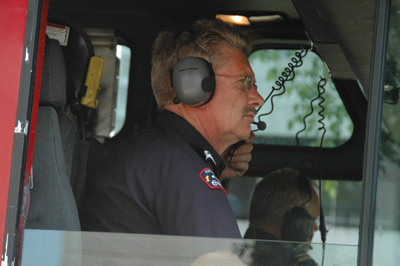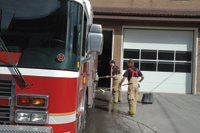
Features
Hot topics
Inside the hall
Seniority versus experience
In December 2006, a defining event happened to my family that made me better understand the culture, brotherhood and camaraderie that exists in the Winnipeg Fire Paramedic Service. In some ways, it solidified my belief about why I chose this vocation in the first place.
February 8, 2011
By Jay Shaw
In December 2006, a defining event happened to my family that made me better understand the culture, brotherhood and camaraderie that exists in the Winnipeg Fire Paramedic Service. In some ways, it solidified my belief about why I chose this vocation in the first place. In other ways, it made me very aware of the perceived but invisible line between seniority and experience, and my role at that time as a very junior member of my service.
My family cottage had burned down and the newspaper headline read, “Fireman’s cabin up in smoke.” No one was injured, insurance covered the losses and the support was tremendous from all, save one detail: An overzealous reporter had tracked down my phone number and wanted a few tidbits for the story. The questions were laced with irony given that a firefighter’s second home had been destroyed by fire: How do you feel as a fire victim? Can you see the other perspective? I tried to answer respectfully and spoke about how the shock of seeing the damage was too real, even though I had been to fires before. Somehow my answers were perceived as arrogant, and the story erroneously read that I had been to “hundreds of fires.” A four-year member of the fire service being at hundreds of fires – wow!
 |
| Firefighting tradition holds that senior personnel work their way up the ranks while more junior staff must pay their dues. Photo by Laura King |
The backlash in the halls was swift and unkind. For the better part of two years after the article was published I was greeted by peers at every fire I went to, asking me what number this was, or “How many fires today, Shaw?” Had I crossed some line? Why the harsh criticism for something that I did not say? I had told the reporter that we go to hundreds of calls, and that I had never truly understood the loss until I stood in the charred rubble of my own cabin. Even as a rookie, my 18-month probationary period was smoother than this. A seasoned, respected veteran called me at the hall and offered his condolences on the loss of our cabin, while lecturing me on the finer points of media relations and all things related to seniority. It was apparent that the culture of our seniority/experience system did not allow for comments of this kind to be stated by someone with my limited experience.
Since that day, I have been hyper aware of my role in regard to my seniority level and experience, and I now believe that the two words are very different. Would I have faced the same criticism had I actually been to hundreds of fires, as the reporter had stated? What if I had 30 years on the job, or even 15 years, all of them at our busiest station for structure fires? Were firefighters upset that I mistakenly claimed to have had hundreds of fires under my belt, equating to tons of experience, or that I had four years on the job and not enough seniority to back up the claim? Firefighters do not like to boast or brag about accomplishments – we prefer to acknowledge the whole team in calls that might have received attention. Have you ever had to buy a round because you got your picture in the paper? Most firefighters are considerably humble. Maybe it is just the Canadian in all of us to be gracious and put the team first, but I think it goes deeper than the maple leaf.
The fact is that the terms seniority and experience mean very different things, yet they are tied to one another through a system of beliefs, values and rights of passage that the fire service has embraced for decades. Seniority and experience decide almost everything in our fire service, from how we treat each other to how we are promoted. Think about your service and how the two terms are used. What do you make your junior members do that senior members do not? Who eats first in your kitchen? Who gets up to answer the phone? Who does a 12-year veteran ask when he or she has a training-related question? These questions can be answered many ways, but consider what criteria you used. Did you use seniority, merit, rank, or operational factors to decide? There are no perfect answers. The system of beliefs we honour – in which I believe and which represents our semi-military structure (the basis for the foundation of an earned respect) – correlates nicely into the teaching of discipline, span of control and unity of command. Without these lessons and foundational principles we would have chaos. However, none of this equates to experience and how we look at these two terms in relation to our culture, hiring, promotions and living in the hall with our peers. Do you as a firefighter respect the rank (seniority), or the time on the fire ground (experience) that a member has, or both? If you have seniority, do you have experience? How do you define and defend your fire department system? Does your department’s culture of seniority cross any lines or policies such as respectful workplace?
 |
|
| The pecking order in Canadian fire departments is based on seniority and experience. While seniority is easily quantifiable – but not necessarily an accurate predictor of leadership abilities or skill – experience is often subjective. Photo by Laura King |
Deputy Chief Frank Lamie, a 35-year veteran currently with Toronto Fire Services, who has held many positions in his respected career, explains how he sees the difference between seniority
and experience.
“I think that experience is a judgment call, so we have defaulted to seniority as its objective. But I do agree that many members with very high seniority have very little experience due to their position and assignments when gaining that seniority. The saying goes, ‘Do you have 30 years of experience, or one year 30 times?’ I think the latter is more often the case. In operations, quiet stations offer very little experience.”
Lamie’s comments are brutally honest in a generational paradigm of fewer fires and more of everything else. This does not mean that some members with many years of service are not qualified to do their jobs, as training is the great equalizer in all operational matters. Toronto Fire Services has a six-step modular system of training and examinations for officers in operations and fire prevention. When a member has passed all six modules, then seniority is the deciding factor in standing and promotion.
Fire Chief Len Garis of the Surrey Fire Department in British Columbia says seniority and experience are different but related in many ways.
“The difference between seniority and experience is subjective. Seniority you earn from time in on the job; experience is what you get while earning your seniority. The problem is the subjective nature of experience.
“We [the Surrey Fire Department] have developed and use a great training tool to make sure our officers and firefighters have the proper balance of skills and education to perform at a high level. Our training for officers is third-party accredited, which adds credibility and a sense of pride
in accomplishment.”
Chief Garis’s observation allows seniority and experience to be accumulated at the same time, but there is still the issue of quantifying the differences among individual firefighters’ experiences. This issue will be harder to determine, thus we must fall back on training to level the playing field.
Too often, we equate experience with how many fires a member has fought and what a member has seen and learned from those events. Fire-service experience is bigger than this one shrinking aspect of what we do. Emergency medical services, motor vehicle collisions, specialty rescues, hazardous materials and prevention all build a collective “experience” that defines who we are and what we have accomplished in our careers. How we treat each other and how we hold one another accountable to a culture that honours our veteran firefighters is one of the most admirable qualities of this profession, as the shifting change has been from measuring firefighters’ worth by the soot on their helmets to a more balanced approach that uses judgment, as Lamie suggests. And for the record, I’ve never counted!
Jay Shaw is a nine-year member of the Winnipeg Fire Paramedic Service, and has more than 15 years’ experience in health and emergency services. He has worked in hospital emergency rooms, with rural ambulance services and with the Canadian Forces fire service. A lifelong learner, Shaw is completing graduate studies in disaster and emergency management at Royal Roads University, and has a strong passion for collaborative disaster and fire-service research. Contact him at jayshaw@mts.net
Print this page